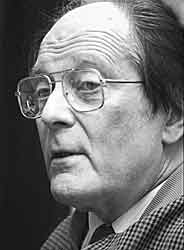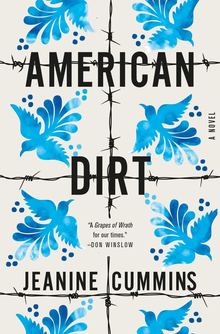This article contains information about the literary events and publications of 1970.

The Good Soldier Švejk is an unfinished satirical dark comedy novel by Czech writer Jaroslav Hašek, published in 1921–1923, about a good-humored, simple-minded, middle-aged man who appears to be enthusiastic to serve Austria-Hungary in World War I.

Uwe Johnson was a German writer, editor, and scholar. Such prominent writers and scholars as Günter Grass and Hans Mayer declared Johnson to be the most significant writer to emerge from East Germany. During the 1950s, he had troubles with the East German authorities, being treated as a "dissident" both for political reasons and for Modernist experiments in his works which made him opposed to the dominant doctrine of Socialist realism; after moving to West Berlin in 1959, he gained the label of "the author of the two Germanies", as, while criticizing the East Germany as the state which betrayed the Socialist ideals, he didn't regard the West Germany as a viable alternative and opposed the division of Germany in general. His works were dedicated both to East and West German societies and examined the relations between them.

Jaan Kross was an Estonian writer. He won the 1995 International Nonino Prize in Italy.

Vasily Semyonovich Grossman was a Soviet writer and journalist. Born to a Jewish family in Ukraine, then part of the Russian Empire, Grossman trained as a chemical engineer at Moscow State University, earning the nickname Vasya-khimik because of his diligence as a student. Upon graduation, he took a job in Stalino in the Donets Basin. In the 1930s he changed careers and began writing full-time, publishing a number of short stories and several novels.

Henry Marie Joseph Frédéric Expedite Millon de Montherlant was a French essayist, novelist, and dramatist. He was elected to the Académie française in 1960.

The Posthumous Memoirs of Brás Cubas, also translated as Epitaph of a Small Winner, is a novel by the Brazilian writer Joaquim Maria Machado de Assis.

Danzy Senna is an American novelist and essayist. She is the author of six books and numerous essays about race, gender and American identity, including Caucasia (1998), Symptomatic (2003), and New People (2017), named by Time as one of the Top Ten Novels of the year. In July 2024 she will publish her sixth novel, Colored Television. Her writing has appeared in The New Yorker,The Atlantic,Vogue, and The New York Times. She is a professor of English at the University of Southern California.
The Red Wheel is a cycle of novels by Aleksandr Solzhenitsyn, retelling and exploring the passing of Imperial Russia and the birth-pangs of the Soviet Union.
Leila Vennewitz was a Canadian-English translator of German literature. She was born Leila Croot in Hampshire, England and grew up in Portsmouth. Her brother was the surgeon Sir John Croot.
The Schlegel-Tieck Prize for German Translation is a literary translation award given by the Society of Authors in London. Translations from the German original into English are considered for the prize. The value of the prize is £3,000, while the runner-up now receives £1,000. The prize is named for August Wilhelm Schlegel and Ludwig Tieck, who translated Shakespeare to German in the 19th century.
Damion Searls is an American writer and translator. He grew up in New York and studied at Harvard University and the University of California, Berkeley. He specializes in translating literary works from Western European languages such as German, Norwegian, French, and Dutch. Among the authors he has translated are Marcel Proust, Thomas Mann, Rainer Maria Rilke, Robert Walser, Ingeborg Bachmann, Hermann Hesse, Kurt Schwitters, Peter Handke, Jon Fosse, Heike B. Görtemaker, Ludwig Wittgenstein, Max Weber, and Nescio. He has received numerous grants and fellowships for his translations.
Biblioasis is a Canadian independent bookstore and publishing company, based in Windsor, Ontario.

The Last Children of Tokyo, originally published in Japanese as Kentoshi (献灯使), is a 2014 science fiction novel by Yoko Tawada. The English version, translated by Margaret Mitsutani, was published in the UK in 2018. It was published in the US as The Emissary.

Mouthful of Birds is a short story collection by Samanta Schweblin. Originally published in Spanish, it was translated into English by Megan McDowell in 2019. The stories feature uncanny plot twists and unexpected endings.

Ducks, Newburyport is a 2019 novel by British author Lucy Ellmann. The novel is written in the stream of consciousness narrative style, and consists of a single long sentence, with brief clauses that start with the phrase "the fact that" more than 19,000 times. The book runs over 1000 pages. It won the 2019 Goldsmiths Prize and was shortlisted for the 2019 Booker Prize.

American Dirt is a 2020 novel by American author Jeanine Cummins, published by Flatiron Books. The book is about a Mexican bookseller who is forced to flee as an illegal immigrant to the United States, along with her son, after her journalist husband exposes a local drug kingpin. American Dirt was a New York Times best seller, selling over 3 million copies worldwide in 37 languages. It was selected for the TV series Oprah's Book Club hosted by Oprah Winfrey, and was on the longlist for the 2020 Prix Médicis étranger. However, the book also gained significant criticism, especially from Mexican-American authors, for its alleged cultural exploitation.

The Lying Life of Adults is a 2019 novel by Elena Ferrante. It was adapted into a television series of the same name by Edoardo De Angelis in 2023.

Vanessa Springora is a French publisher, writer and film director. She is the author of the memoir Consent, describing sexual abuse she experienced beginning at age 14 from author Gabriel Matzneff, then 49. The book became a bestseller and prompted changes to the French age of consent.
Gesine is a German feminine given name and may refer to:













